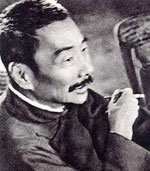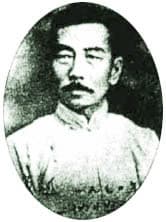Lu Xun
Critique

Born
1881
Died
1936
Publications
Novels, stories, essays
Writing languages
Vernacular Chinese, Literary Chinese
Literature
• The True Story of Ah Q (1919)
• Old Tales Retold (1935)
Novellas
• The True Story of Ah Q (1919)
Stories
• "Diary of a Madman" (1918)
Chinese Literature
• "Diary of a Madman" (1918)
• The True Story of Ah Q (1919)
• Wild Grass (1927)
• Old Tales Retold (1935)
A literary calling to arms
For many years Lu Xun was hailed as the cultural standard bearer of the Chinese revolution, coming to the fore in the bourgeois revolutionary period of China and heralding the socialist revolution he never lived to see. But politics aside, he may be considered the father of modern Chinese literature, which was ushered in with the changes of the twentieth century.
However, politics cannot be kept aside. Lu Xun's writing that overthrew feudal literary norms was not merely coincidental with the evolution that eventually overthrew both feudal and bourgeois political power. Lu Xun actively supported the growing Communist revolution. His work was intended as a clarion call to replace the ways of the past—artistic, social and political. His first collection of stories is known, after all, as Call to Arms.
However, this should not give the impression that Lu Xun's writing was one-dimensional, or that artistic and human value were sacrificed to some expedient political goals. The writer identified deeply with the oppressed Chinese people. His words told their life stories in all their aspects, in much the same way that Maxim Gorky's stories of villagers, tramps, workers and students depicted the real world of pre-revolutionary and revolutionary Russia.
"Lu Xun" (or "Lu Hsun" in the older transliteration, though also sometimes rendered into English as "Lusin") is a pseudonym. The writer was born Zhou Zhangshou into the gentry in Chekiang Province in China, later changing his name to Chou Shu-jen (Zhou Shuren) and adopting Lu Xun as a pen name. He was educated in both the Chinese classics and Western philosophy and literature. He studied medicine in Japan but is said to have abandoned it in anger after watching a Japanese film showing a Chinese spy being executed while other Chinese watched impassively. He devoted himself to trying to change China through writing. He taught at various Chinese schools and universities and joined the rebellious New Literature Movement.
 His
story, "Diary of a Madman" (1918), using the title of a Gogol story,
is considered the first modern Chinese story because it uses the language
that people spoke, rather than the refined literary style exemplified
by the works of Lao Tze and Confucius. (Writing in the vernacular has
proven to be a break with the past that all cultures must make in order
to bring forth a flowering of popular literature. Asian countries seem
to have been slower to reach this point, perhaps due to the persistence
of the feudal systems there.)
His
story, "Diary of a Madman" (1918), using the title of a Gogol story,
is considered the first modern Chinese story because it uses the language
that people spoke, rather than the refined literary style exemplified
by the works of Lao Tze and Confucius. (Writing in the vernacular has
proven to be a break with the past that all cultures must make in order
to bring forth a flowering of popular literature. Asian countries seem
to have been slower to reach this point, perhaps due to the persistence
of the feudal systems there.)
The True Story of Ah Q (1919) is his best-known work, which could be called either a long story or a short novel and details the life of a hapless, ignorant character buffeted by the forces of society, both high and low. "Diary of a Madman", The True Story of Ah Q, and twelve other early works were collected in Call to Arms in 1922. (The book's title Na Han is more literally translated as Cry Out, I'm told.)
Two other collections followed. Wandering (1925), whose original title Pang Huang apparently suggests something more like agitation than our English sense of aimlessness, includes his second most famous story "The New Year Sacrifice" about the life of a working woman whom everyone calls only "Hsiang Lin's wife". Old Tales Retold (1935) recast Chinese legends in new form, often quite irreverently.
It can be difficult to find these books. You might uncover the Selected Stories of Lu Hsun, published by China's Foreign Language Press in 1972 and picked up by an American publisher. It includes 18 of his best stories, plus the Preface for Call to Arms in which he spells out his intentions as a writer. Other collections are also available.
Lu Xun wrote 16 volumes of essays, ferociously attacking government policies of the day and other social ills in a Chinese short essay form called "sanwen". He also produced a book of prose poetry, Wild Grass (1926) and he translated into Chinese the work of many other progressive writers, including Leo Tolstoy, Nikolai Gogol and Maxim Gorky.
— Eric
Critique

